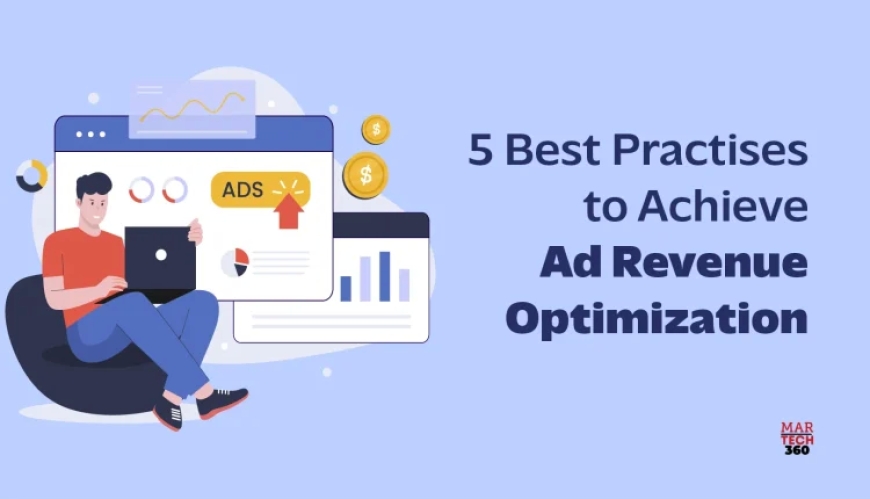5 Key Tactics for Boosting Ad Revenue Optimization
Ad revenue optimization is a crucial strategy for maximizing the revenue generated from each user interaction with ads. This involves evaluating and refining key elements that impact ad performance, such as ad placements, formats, quality, target audience, and user experience (UX). The ultimate goal is to increase engagement and improve click-through rates (CTRs).

Ad revenue optimization is a crucial strategy for maximizing the revenue generated from each user interaction with ads. This involves evaluating and refining key elements that impact ad performance, such as ad placements, formats, quality, target audience, and user experience (UX). The ultimate goal is to increase engagement and improve click-through rates (CTRs). Marketers can achieve this by delivering high-quality ads to the right audience, thus increasing revenue per ad impression. In this article, we'll dive into why ad revenue optimization is essential and the most effective practices to implement.
The Significance of Ad Revenue Optimization
Ad revenue optimization is essential for businesses that depend on PPC (pay-per-click) advertising as a revenue stream. It brings numerous benefits, including:
- Higher Return on Investment (ROI)
Optimizing ads allows businesses to generate more revenue for every dollar spent on PPC campaigns, boosting ROI.
- Enhanced Ad Campaign Performance
Improving various aspects of PPC campaigns can significantly improve their performance, increasing CTRs on platforms like Google Ads.
- Reduced Advertising Costs
Optimized ads help reduce overall marketing costs by targeting the most relevant keywords, ensuring better ad relevance and minimizing spend on underperforming ads.
- Improved Audience Targeting
Analyzing data from PPC campaigns provides valuable insights into audience behaviors, preferences, and needs. This helps marketers fine-tune targeting and increase conversion rates.
Effective Strategies for Ad Revenue Optimization
To achieve better ad revenue, marketers should consider adopting the following best practices:
1. Conduct Comprehensive Keyword Research
Choosing the right keywords is a foundational element of ad revenue optimization. Proper keyword selection ensures ads reach the right audience, leading to more impressions, higher CTRs, and conversions. Follow these best practices:
- Leverage tools like SEMrush, Ahrefs, or Google Keyword Planner to identify high-performing keywords and evaluate their search volume.
- Prioritize long-tail keywords with lower competition but more focused traffic potential, ensuring they are specific and relevant to your offering.
- Avoid overly broad keywords that may bring irrelevant traffic and lead to wasted ad spend.
- Regularly analyze search terms reports in PPC tools to identify effective keywords and eliminate those that do not perform well.
2. Optimize Ad Copy and Creative Elements
Along with keywords, the ad copy and creative materials are essential for driving a successful advertising campaign. To increase CTRs and conversions, ensure your ad copy is:
- Engaging, relevant, and action-oriented.
- Clear with strong calls-to-action (CTAs) to prompt users to take action.
- Enhanced with ad extensions such as structured snippets, callouts, and site links to provide additional details and improve ad visibility.
Ensure that the copy aligns well with targeted keywords and landing pages. Run A/B tests on different ad variations to determine which versions perform best with specific audiences and keywords.
3. Optimize Landing Page Design
Once users click on an ad, they are directed to a landing page. To improve conversion rates, the landing page should be designed to keep users engaged and encourage them to complete the desired action. Key strategies include:
- Crafting a compelling and clear value proposition that resonates with visitors.
- Enhancing aesthetics by adding images or videos to improve user experience and engagement.
- Implementing a clear CTA that encourages users to take the next step.
- Ensuring that the landing page is mobile-optimized, as most users access websites from mobile devices.
4. Fine-tune Bid Management Strategies
Bid management is a critical element in determining how much to pay for each ad click. By using automated bidding tools like Google Ads’ smart bidding, businesses can leverage machine learning to adjust bids based on the likelihood of conversion. This allows companies to:
- Increase bids for high-performing ads.
- Lower bids for underperforming ads to optimize spending.
- Adjust bids based on competitive analysis to remain competitive during ad auctions.
- Consider timing, device, and location factors to better target the right audience.
5. Test and Experiment with Ad Variations
Ad testing and experimentation are essential for optimizing ad revenue. Conducting A/B tests on different ad formats and targeting strategies helps identify which ad configurations produce the best results. Marketing teams should:
- Experiment with different ad sizes, formats, and creatives to compare performance.
- Test various targeting strategies, including location-based and audience targeting.
- Track the impact of changes to PPC campaigns, such as bid adjustments or copy revisions, to measure their effect on performance.
By embracing continuous testing and experimentation, marketers can refine campaigns and boost ad revenue.
Conclusion: Achieving Successful Ad Revenue Optimization
In today’s digital landscape, where consumer behavior is rapidly evolving, optimizing ad revenue is more important than ever. To stay competitive, advertisers must ensure that every dollar spent on PPC campaigns yields maximum value. By implementing the right tools and following best practices for ad revenue optimization, CMOs can improve campaign performance, maximize ROI, and stay ahead in the highly competitive digital advertising space.
What's Your Reaction?















![*Love Hurts [2025] 'ENGLISH' HD-4K FuLLMovie](https://news.bangboxonline.com/uploads/images/202502/image_430x256_67a7ec31275e4.jpg)
![*Back in Action [2025] 'ENGLISH' HD-4K FuLLMovie](https://news.bangboxonline.com/uploads/images/202502/image_430x256_67a7db369418b.jpg)
![*Kraven the Hunter [2025] 'ENGLISH' HD-4K FuLLMovie](https://news.bangboxonline.com/uploads/images/202502/image_430x256_67a7d9a33fd6c.jpg)
![*Sonic the Hedgehog 3 [2025] 'ENGLISH' HD-4K FuLLMovie](https://news.bangboxonline.com/uploads/images/202502/image_430x256_67a7d7d7046d6.jpg)



